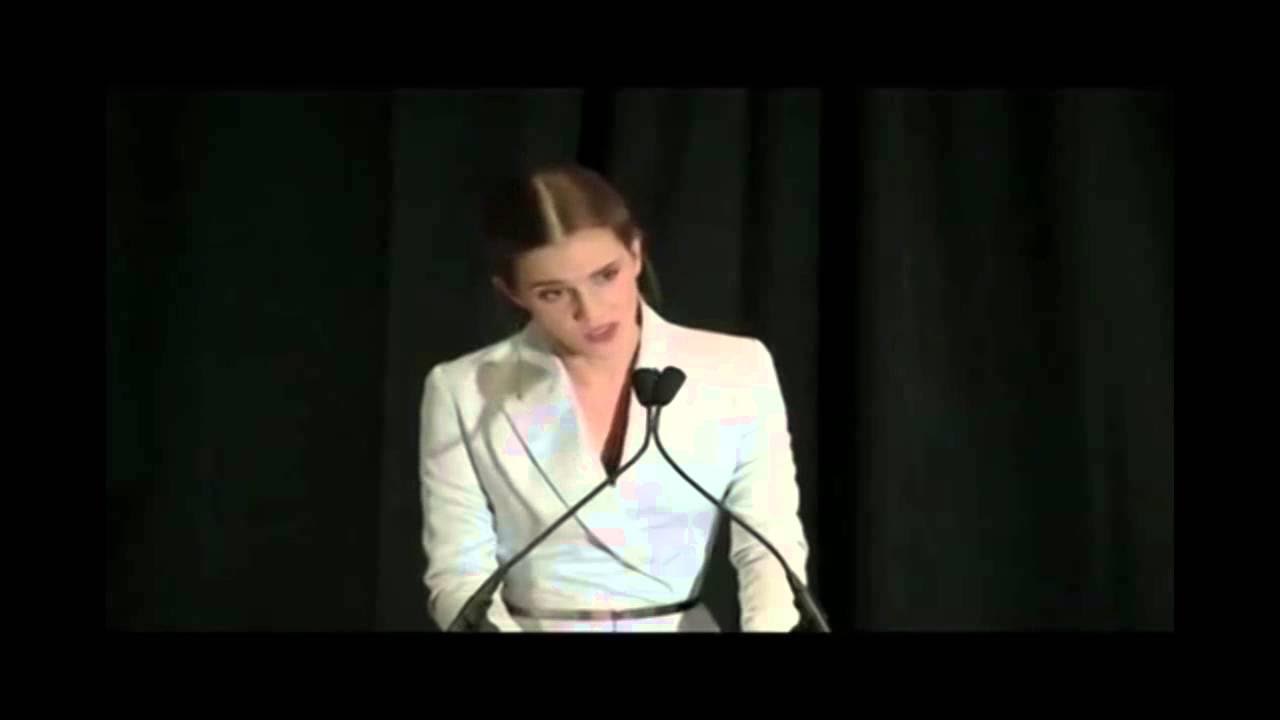Emma Watson's Speech on Gender Equality | ENGLISH SPEECH with BIG Subtitles
Summary
TLDRIn her speech as a UN Women Goodwill Ambassador, the speaker addresses the misconception that feminism equates to man-hating and clarifies it as the fight for gender equality. She recounts personal experiences that led her to embrace feminism and challenges the stigma around the term. Emphasizing the importance of involving men in the conversation, she calls for a collective effort to dismantle gender stereotypes for the benefit of all, highlighting the 'HeForShe' movement as a unifying force for change.
Takeaways
- 🌟 The speaker was appointed as a goodwill ambassador for UN Women and emphasizes the need to redefine feminism as a movement for equality, not man-hating.
- 📚 Feminism is defined as the belief in political, economic, and social equality of the sexes, aiming for equal rights and opportunities for all genders.
- 👶 The speaker's questioning of gender norms began at a young age, highlighting the early impact of societal expectations on both boys and girls.
- 🚫 The term 'feminist' has become unpopular and is often misunderstood as being too aggressive or anti-men, which the speaker aims to challenge.
- 👏 The speaker advocates for equal pay, bodily autonomy, and involvement in policy decisions that affect women's lives, as fundamental human rights.
- 🌍 The reality is that no country has achieved true gender equality, and these rights are still a struggle for many women worldwide.
- 🏆 The speaker acknowledges her own privilege and the role of inadvertent feminists in shaping her beliefs and opportunities.
- 🤝 An invitation is extended to men to join the conversation on gender equality, emphasizing that it is an issue that affects everyone, not just women.
- 💪 The speaker calls for the dismantling of gender stereotypes that confine both men and women, advocating for a spectrum of gender expression.
- 👨👧👦 Men also suffer from the constraints of gender norms, and the speaker points out the negative impacts on mental health and societal roles.
- 🔍 The 'HeForShe' movement is introduced as a unifying force for gender equality, encouraging individuals to take action and make a difference.
Q & A
What is the primary definition of feminism according to the speaker?
-Feminism, by definition, is the belief that men and women should have equal rights and opportunities, encompassing the theory of political, economic, and social equality of the sexes.
At what age did the speaker start questioning gender-based assumptions?
-The speaker started questioning gender-based assumptions when she was 8 years old, after being called 'bossy' for wanting to direct plays.
What issues did the speaker's friends face at the age of 15?
-At 15, the speaker's female friends started dropping out of their beloved sports teams because they didn't want to appear 'muscly', indicating societal pressures on girls' body image.
Why did the speaker decide to become a feminist?
-The speaker decided to become a feminist after witnessing various forms of gender inequality and realizing the need for change, which seemed uncomplicated to her.
What misconception about feminism does the speaker address in the script?
-The speaker addresses the misconception that feminism is synonymous with 'man-hating', emphasizing that it should be about equality and not hostility towards men.
What does the speaker believe should be the societal response to gender equality?
-The speaker believes that gender equality is not just a women's issue but also a men's issue, and that both genders should feel free to be sensitive and strong without societal constraints.
Why does the speaker think men should be involved in the conversation about gender equality?
-The speaker thinks men should be involved because they too are affected by gender stereotypes and can contribute to change by challenging these stereotypes and supporting equality.
What is the 'HeForShe' movement mentioned by the speaker?
-The 'HeForShe' movement is a unifying campaign inviting men to step forward and support gender equality, emphasizing that it is a collective issue that affects both men and women.
What is the speaker's view on the current state of gender equality worldwide?
-The speaker states that sadly, there is no country in the world where all women can expect to receive equal rights, and no country has yet achieved true gender equality.
How does the speaker describe the impact of gender stereotypes on men?
-The speaker describes how gender stereotypes make men feel fragile and insecure, causing them to suppress their emotions and leading to issues such as mental health problems and a distorted sense of male success.
What is the speaker's call to action for the audience?
-The speaker calls on the audience, particularly men, to take up the mantle of gender equality, to allow themselves and others to be free from prejudice, and to embrace a more complete version of themselves.
Outlines

This section is available to paid users only. Please upgrade to access this part.
Upgrade NowMindmap

This section is available to paid users only. Please upgrade to access this part.
Upgrade NowKeywords

This section is available to paid users only. Please upgrade to access this part.
Upgrade NowHighlights

This section is available to paid users only. Please upgrade to access this part.
Upgrade NowTranscripts

This section is available to paid users only. Please upgrade to access this part.
Upgrade NowBrowse More Related Video

Inspirational speech to United Nations on gender equality, Emma Watson

Emma Watson HeForShe Speech at the United Nations | UN Women 2014

Emma Watson Speech Consecutive Interpreting Task

ENGLISH SPEECH | EMMA WATSON: Gender Equality (English Subtitles)

Emma Watson at the HeForShe Campaign 2014 - Official UN Video

Tự học từ vựng IELTS Speaking qua bài phát biểu của Emma Watson | ELSA Speak
5.0 / 5 (0 votes)